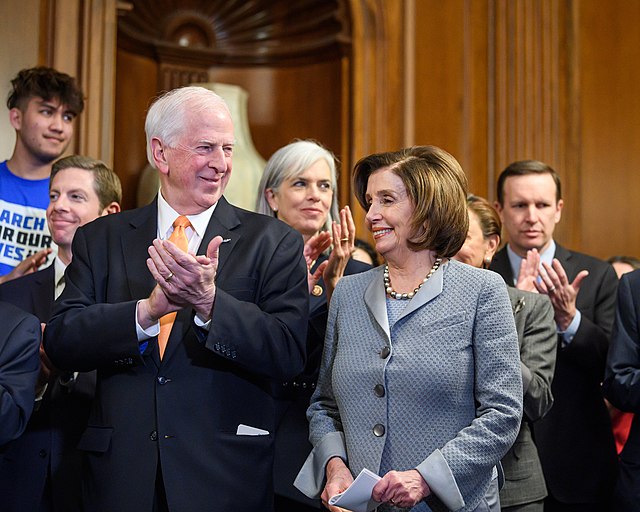
Neoliberalism is the Bipartisan Consensus, Not the Lesser of Two Evils
Kristoffer Hellén | December 15, 2020
Few intellectuals on the left are as widely respected as Cornel West. Because he is a decorated, recognized leftist intellectual and activist, West has been placed on a pedestal, and many on the left take his words as gospel. While many of West’s critiques of power are spot on, the left’s canonization of him makes it difficult to challenge him when he is wrong, and when it comes to the issue of neoliberalism, his framing couldn’t be more flawed. Every great intellectual has their blind spots and, whether intentionally or not, West’s views ultimately serve the establishment power structure. Rather than an attempt to cancel West, my critique should serve as a warning against elevating any individual to the status of moral beacons deserving of total deference.
My issue with West is that he routinely conflates neoliberalism with the Democratic Party establishment, while contrasting “the neoliberals” with Trump Republican “neofascists.” On the November 6th episode of The Dig podcast, West describes our systemic rot as the fault of “the neofascist wing of the ruling class, which is Trump and company, and the neoliberal wing of the ruling class, which is Biden and Harris.”
I am not disputing that the Democratic establishment subscribes to a neoliberal ideology, but the idea that neoliberalism is a bounded partisan affiliation which excludes the Republican Party is simply false. West ought to know better, but his status as the left’s greatest intellectual has given validity to the idea that the term “neoliberal” has a partisan affiliation.
West’s incorrect partisan conceptualization of neoliberalism is not only wrong, but it is misleading. While the word “neoliberal” is etymologically related to the word “liberal,” it has no relationship with the current political usage of the term “liberal” and its modern association with the Democratic Party. Rather, it harkens back to the 18th century Scottish economic philosopher Adam Smith who advocated the removal of all tariffs and restrictions on free capital so that the “invisible hand” of the market could bring prosperity to all. In the post-WWII years of the 20th century, Smith’s ideas about the liberalization of capital were brought back into the spotlight by economist Friedrich Hayek and, later, Milton Friedman whose goal was to completely dismantle the social safety nets of FDR’s New Deal, which, it was argued, hampered free capital. Thus, neoliberalism is a “neo” form of 18th century economic liberalism and has no connection to the political “liberalism” of today’s Democratic Party.
Neoliberal economics gained political traction under Carter, but Reagan was the first president who made Friedman’s arguments the cornerstone of his administration. Reagan’s famous declaration that “the nine most terrifying words in the English language are ‘I’m from the government and I’m here to help’” is a perfect summation of neoliberalism. Neoliberalism later became dominant in the Democratic Party with Bill Clinton and the Third Way Democrats, those “socially liberal but fiscally conservative” types who believed that the Democratic Party would have to kowtow to corporate interests and adopt Republican neoliberal policies in order to fundraise and stay competitive as a party. Since Clinton’s total abandonment of the Democratic New Deal legacy, neoliberalism as an economic ideology has enjoyed bipartisan hegemony. Thus, when people hear “neoliberal,” they should not think “Democrat,” but rather “the bipartisan Washington economic consensus.”
The stakes of not understanding neoliberalism are much more than semantic. Many leftists today rightfully condemn neoliberalism as the main obstacle to progressive legislation, but when the public is so misinformed and misled about what neoliberalism actually is, the concept loses all meaning. Cornel West, by contrasting the “neoliberalism” of Biden with the “neofascism” of Trump, has been the main voice misleading the public about what neoliberalism is. Regardless of his intent, language shapes how we conceptualize the world, and it is worth considering how the partisanization of these terms actually serves the ruling class. In 2020, West pushed the idea that the left must vote for Biden as an anti-fascist vote. Thus, while acknowledging the evils of Democratic neoliberalism, in his view, Republican neo-fascism was the greater evil. This partisan view obscures the many ways in which the Trump administration has been a proponent of the neoliberal agenda, for example, by cutting corporate taxes and deregulating the private sector. Pushing the view that neoliberalism is the “lesser evil” did not merely garner votes for Biden, it also manufactured consent for neoliberal hegemony by packaging it as a tolerable alternative to “neofascism.” This may help explain why West’s voice is not only tolerated by the bipartisan neoliberal establishment (CNN, Fox News, MSNBC), but in some ways has been elevated, for example, by featuring him on their networks.
When today’s leftists hurl the word “neoliberal” as a slur for establishment Democrats, they are reinforcing the idea that neoliberalism is a partisan concept and not an economic ideology. In reality, neoliberalism is a coherent worldview with true believers whose main goal is to deregulate the economy, end corporate taxes, and remove any social safety net for working people - those things neoliberals argue interfere with the invisible hand of the “free market.” Whatever their intentions are, leftists like West who continually describe neoliberalism as unique the Democratic establishment dumb down the public and herd them in a direction that serves power.